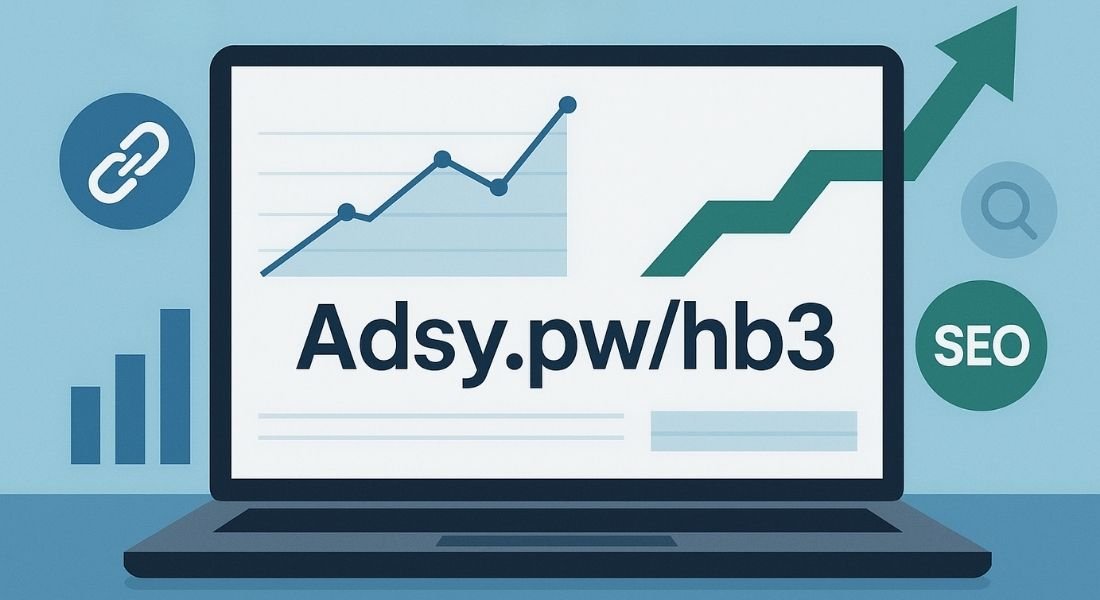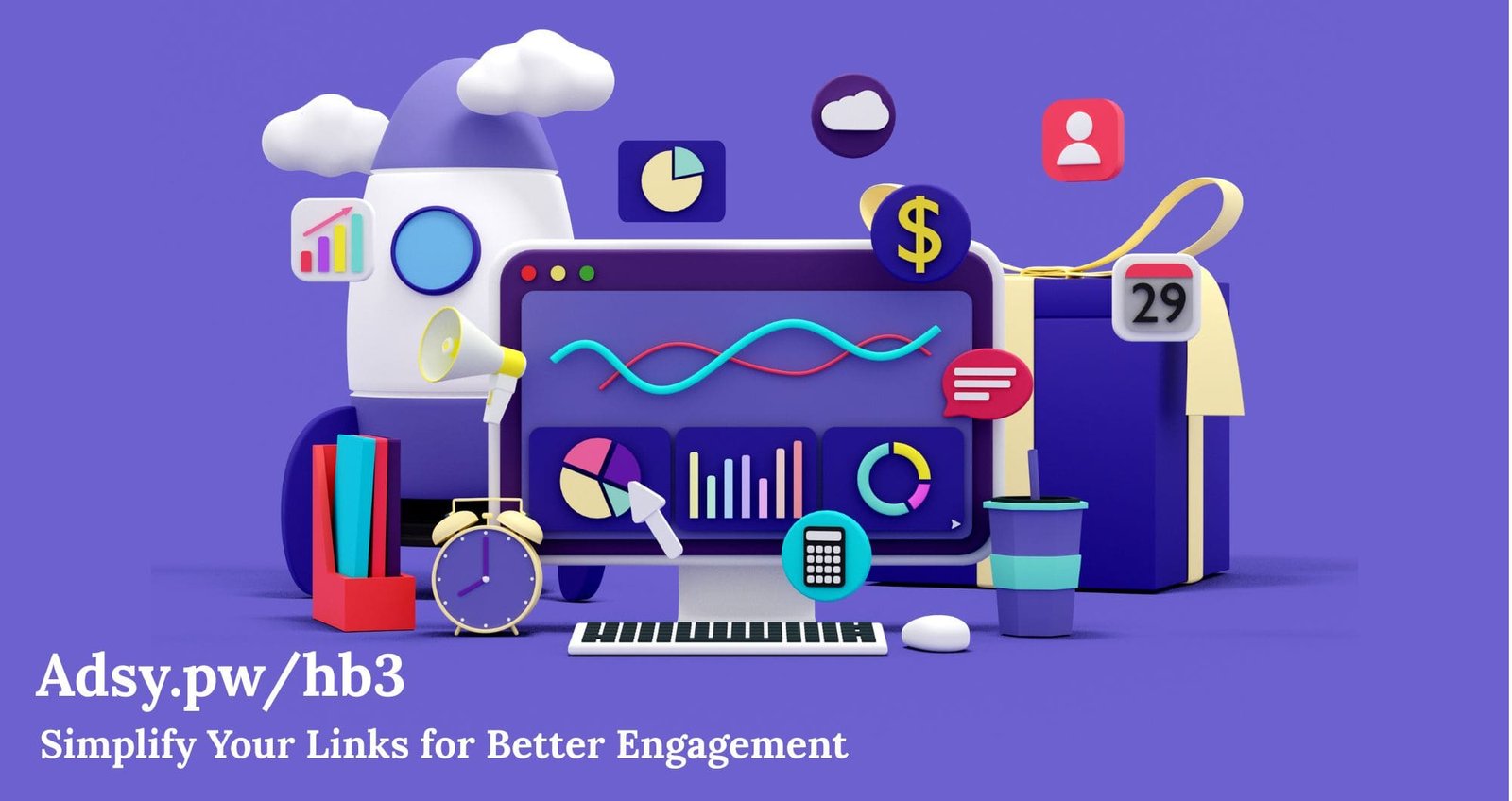Daniel H. Moore is a digital marketing consultant and cybersecurity analyst who can bring this blog post as one of the first research findings in the topic of investigation. He has experience in analyzing internet traffic, web address monitoring functionality, and internet advertising solutions. In the last 10 years, Daniel cooperated with marketing companies, internet publishers, and cybersecurity companies to explore the characteristics and systems of the shortlink platforms, advertisement-driven redirect chains, and monetization networks. His investigative reports on spoofed websites, affiliate traps, spying URLs have supported the consumers as well as professionals explore the online life in a more safe and smart way. This post on adsy.pw/hb3 is a collection of technical, as well as user-perceiving knowledge of the way such links work and why they are important in the modern web.
introduction
Modern digital world consists of billions of pages and sites and the shortened URLs and Redirection system have become ingrained into the process of web interaction. They can be anywhere, in tweets, through text messages, as a part of the description of the videos on YouTube or, simply, they can be read through advertisements online. Adsy.pw/hb3 is one of those URLs that have created awareness and fear on the internet. This URL seems to be an outcome of a monetized redirect service that goes into the advanced role of link shortening. Rather, it becomes a tool to collect ad money, user information and drive web traffic at certain directions.
This blog is going to provide an in-depth analysis of what adsy.pw/hb3 technically does, how shortlink monetization services work, the benefits and risks they carry to various stakeholders and also how people can save themselves against fraudulent link practices.
History of URL Shorteners and Transformation into a means of Monetization
The history of URL shorteners goes back to the years when the easily shared text via microblogging and SMS had a limited character count and therefore limiting the possibility of shortening long URL. Applications like TinyURL and Bit.ly were hit instantly as they allowed compression of long links into short, neat and beautiful looking links. Shorteners were everywhere because more people started to use the internet to share the content and engage in affiliate marketing.
But the fundamental usefulness of such tools has shifted quite radically throughout history. They have come a long way beyond being just convenient to being high-end platforms of monetization. This development was also mainly prompted by digital advertising industry which saw an opening to place advertisements between the click and the content. Rather than take a user directly to a terminal web page, the short link redirects them to one or more pages that may be in the form of advertisement or used to collect data.
The sites like adsy.pw with links like adsy.pw/hb3 belongs to the new generation of redirect domains aimed at making money on user click. These links give their creators, whether bloggers, app designers or developers, influence producers or affiliate marketers, a source of revenue each time they are interacted with.
Breaking down adsy.pw/hb3: A Peek Behind the Curtain
On the surface, adsy.pw/hb3 is some kind of ordinary shortening link. It does not describe or indicate where it intends to go or it does not initially show or add clues on its source. But when a person clicks the link, he or she is hardly directed to the required site directly. Rather, a successive wave of redirects happens. Such redirections may comprise:
The loading page having a timer are presented that compel the user to watch a banner ad.
Any secondary site that shows false alerts like false download buttons.
Installation of JavaScript or cookies to gather data concerning the browser and the devices used.
An auto-redirect kingdomg an affiliate landing page or survey gate.
Most probably, the hb3 part of the link can serve as a special tracker on the platform or by the user, allowing keeping track of the source of the clicks, which devices people used, and whether a conversion was made. This monitoring is inimitable in affiliate marketing, because it is possible to pay in accordance with performance.
The domain itself; adsy.pw, is in the top-level domain of “.pw”, which technically belongs to the island country of Palau but has a reputation of unrestricted registration because of its availability to the general population. It is also anonymous or off-shore hosting that is fairly obscure.
The Working Revenue Model of Link-Based Ad Networks
With the adsy.pw/hb3 link, the revenue opportunity of the site is based on an ad impression-based model, a pay-per-click-based payment, and an affiliate-payment system. A user who follows the link and is subjected to advertising the consumer may see in the form of a page view, a pop-up, an interstitial advertisement: the person who constructed the link is paid. The intermediate platform receives payment by the advertiser to get into the attention of the user, and the income is then divided between the link sharer and the intermediate platform.
This may include a few cents per click or more, depending on the quality and policy of the ad network: if the user does something as simple as install an app, submit an email, or make a purchase it is possible to pay more. Such incentive frameworks will use the sharing of links and the desire to earn as much engagement as possible.
The drawback though is that business is rampant with exploitation. There are also well-known ad networks that deliver malicious placement, click baity, or user manipulation to convince a user to click on something they do not need to. This diminishes the lists and makes the ecosystem full of suspicion.
Experience of the User and Trust Fears
People who visit such links as adsy.pw/hb3 tend to feel a bit misgivings. The obfuscated structure of these URLs lacks any context, so it is hard to determine whether such a destination is safe or relevant. The regular user does not even have a clue as to whether he or she will be landing to a legitimate site or just on a spammy advertisement page or a worse still malicious one.
One of the major drawbacks of sharing like that on a regular basis is that it can badly affect the reputation of the sharer particularly when this link results in something frustrating or unsafe. It does not matter whether you are a YouTuber that adds links to your video description, or a person on Reddit that posts information, links you post will determine the attitude of your audience towards you.
Once trust is lost, it was not regained easily. This is why sharing links ethically and maintaining a certain level of transparency in the modern digital world is that important.
Digital Privacy and Tracking – What Is being Collected?
The hidden trail that shortlink platforms leave is one of the most alarming aspects of such platform. When you click on the adsy.pw/hb3, what starts is a sequence of backend conversations between your browser and a number of servers. In the process, there are multiple points of data harvested:
Location and IP address
Version and type of browsers
Device type and operating systems
Check the site and go to origin.
Time of access and frequent of visits
Such data are usually employed to make faceless user profiles that would be used in target advertising. They can be compared in some cases to the third-party data brokers to develop more detailed behavioral profiles. Although effective in targeted ads, this process brings enormous ethical and legal concerns to the forefront, particularly in consideration of the international data protection standards.
In such territories as the European Union, this process needs to adhere to the GDPR, according to which any personal data is to be collected after the consent of the user. Violating it may have severe legal and financial consequences.
Securities: The Dangerous Links: Security Concerns:
Although not every link such as adsy.pw/hb3 was supposed to be malicious, the shortlink business has also joined the cybercriminals, unfortunately. Criminals also use shortened URLs to cover harmful contents. These can be phishing pages which copy-paste popular websites, malware installers that appear like download files, and sham surveys where you will be asked to enter authentication details.
Having several levels of the redirection behind the real destination the user may feel careless even in case they are rather tech-sale. There is also a good possibility that some links automatically download malicious files or redirect the visiting user through multiple spammy sites to a landing page.
As a counter measure, modern browsers, antiviruses, and email providers all now have the detect and warn feature, which automatically blocks known malicious redirect links. But these systems are not fail proof and new threats come up every now and then.
Recommended Practices in Viewing or accessing such Links as adsy.pw/hb3
It is always important that you follow a link without creating one like adsy.pw/hb3, with a lot of awareness. As a link creator, choosing a high-quality shortener and monetization system that focuses on the safety of the users and their transparency is of great importance. And you should always test your links so that it does not lead to an aggressive pop-up or bad landing pages.
You might want to give context when sharing such links. A brief message of what the user is to anticipate assists to develop the trust and enhances the interaction.
The reception-side users can provide a translation of where a shortened URL leads by employing a browser extension/link-expansion tool, which displays a preview. To have security information prior to clicking, one may also hover on the link (when there is one) and scan with real-time scanning tools. Do not click on links in spam messages or unknown websites or other messages that promise you something in a short period of time or that give information that sounds too good to be true.
The Future Prospects: The Way to Transparent Monetization
Due to the increased attention of regulators and the demands of privacy-aware platforms, the future of link monetization will probably change towards the greater level of transparency and user agency. Offering services where users can have a clear preview, offer GDPR opt-in with good user experience, and offer ethical ad partnerships will be a success.
Blockchain tracking and decentralized models of content can also contribute to the reinvention of the ways of processing traffic and revenue. The industry can make steps towards a healthier online world by letting creators monetize on their viewership with no annoying advertising and misleading redirections. Monetized short-links have to balance between profit, user trust, privacy and compliance to be sustainable.
Conclusion
The meager gateway of Adsy.pw/hb3 serves as a portal to something much more and more complicated which lies below the surface of our day-to-day internet activity. The seemingly innocent click can actually belong to a complex sequence of advertising, tracking, datamining and cash making.
To content producers, this system provides a way of selling online interaction. It presents opportunities and risks to the users. Being aware of the way such links work, we are prepared with the means of perusing the web in a smarter and secure way.
Transparency is going to be the driving force in the modest sharing and consuming of content in our digital future of privacy, ethics, and smarter technology. The consciousness is not only helpful but it is a must.
Frequently asked questions (FAQ)
What is adsy.pw hb3?
Adsy.pw/hb3 is a URL redirector, or a URL shorter that probably redirects users via advertising or tracking websites prior to arriving at a destination site. It is monetized in monetization purposes.
Can I click on adsy.pw/hb3?
Not every such link is unsafe, but one should be more cautious. Certain of such links can bring to false advertisement, pop-ups, or malicious downloading. It is advisable to use some kind of link scanner or preview tool.
What is the means through which argos earn money with links such as adsy.pw/hb3?
They generate profits by redirecting traffic of users via ad exchange. Any click or interaction can bring in revenue in the form of affiliate parts or impressions.
Do these links have the capacity to trace personal data?
Yes. Third-party links may capture the data about the user including IP address, device information, and type of browser, but this is usually employed in advertising statistics or behavioral profiling.
What can individuals do to keep safe?
It is best not to click suspicious and short links all together and more so with those that are not trusted. Activate preview utilities and malware browser extensions and keep your browser up to date.
Does it matter legally to use such links?
It depends on how tracking and advertising is used, it should not go against privacy acts such as GDPR. The nonconsensual collection of data of its users may lead to the violation of regulations.

